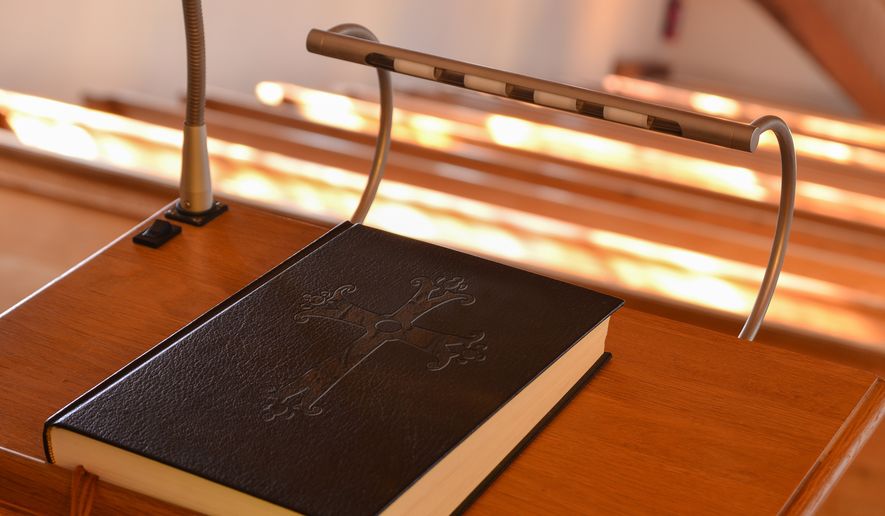America’s clergy have lost the confidence of millions, according to two recent surveys, and experts say pastors will have to confront some harsh truths to regain that trust.
A poll released this week by Barna Group, an evangelical Christian polling firm, found that only 57% of Americans at least “somewhat agree” that a pastor is a trustworthy source of wisdom. The results drew on surveys conducted for “The Resilient Pastor,” a new book by Barna senior fellow Glenn Packiam.
Nearly a quarter of Americans, 24%, say they’re “unsure” about the trustworthiness of pastors, with 1 in 5 Christians (21%) doubting the clergy. And only 21% of pastors say their neighbors “very much” see them in a trustworthy light.
A survey in late 2021 by the Pew Research Center showed that 67% of Americans had “a fair amount” or “a great deal” of confidence in religious leaders “to act in the best interests of the public,” down from 76% in 2018.
Barna Group President David Kinnaman said in an interview that the latest numbers confirm a decades-long trend.
Three decades ago, he said “there was a generally higher favorability towards faith leaders” among the public. But he said “there’s certainly an overall decline” in such confidence since then.
“Looking back through other social research, it looks like that trend is more than 30 years in the making,” Mr. Kinnaman said. “Looking to clergy as a source of moral leadership for the country is now just really only among a small segment of Americans, rather than the whole population.”
Adam W. Greenway, president of Southwestern Baptist Theological Seminary in Fort Worth, Texas, agreed that the “good old days” when pastors were held in higher regard across a community aren’t today’s reality. Mr. Greenway told The Washington Times that his experience in the southern states reflected a level of respect for a region’s clergy.
“Certainly, in parts of our country, there was a time when I think the pastor was a more well-regarded member of the community and society,” he said. “The minister oftentimes was seen as a leader of the community, he was often one of the most educated individuals in the community was seen as sort of an influencer and an authority figure, not just in the particular congregation, that minister may have served.”
He said conditions changed to where “pastors and ministers oftentimes [were] more relegated to the kind of a provincial status, as opposed to broader esteem and respect in the community.” And that was even before recent “scandals have, in many cases, given people a reason to question further particular individuals in ministry,” he said.
Mr. Greenway said the scandals and “falls from grace” of “higher profile individuals” in Christian circles have also contributed to the decline in respect for clergy opinions, along with “a broader cultural tendency” of diminished respect for many institutions. He said social media’s ability to take a local incident and make it “universal” has also been a factor.
“It’s a perfect storm, if you will,” he said.
Terra A. Mattson, a licensed marriage and family therapist in the suburbs of Portland, Oregon, said “celebrity worship” of pastors, with congregations “putting them on pedestals” has left clergy “a little disconnected from their own humanity.”
“That is creating a dynamic and a pressure that has gotten us to this point to say we don’t trust that they’re doing their work or that they are who they say they are,” said Ms. Mattson. She and husband Jeff co-authored “Shrinking the Integrity Gap: Between What Leaders Preach and Live,” a book addressing the question of regaining credibility for Christian leaders and others.
The solution, she said, lies in ministers asking themselves, “Do you know your story? Do you know your own sense of humanity where you’re vulnerable, where you struggle? That is honestly the start of building trust with the people you lead.”
She said many in ministry bring “baggage” from their own abuse, trauma, and mental health issues. Clergy “need to do their own work, know their own story [in order] to understand the people they lead better and to really bridge the gap with empathy.”
Jeffrey Brown, a veteran pastor and associate editor of Ministry magazine, based in Silver Spring, Maryland, said “As pastors, we need to run in our lane. We’ve got to stop conveying or giving the impression that we are knowledgeable in areas that are not our level of expertise.”
While it’s important for clergy to reflect on their roles and what motivates them, pastor Sam Collier of Atlanta’s Hillside Church, said it’s important to remember there are a lot of positive examples despite cultural conflicts.
“There are far more church leaders and churches truly making a big difference, but sadly the negative stories (like most things) greatly overshadow the positive work happening all around the world,” Mr. Collier said in a statement. “We’ve got to do a better job promoting the good.”
Correction: An earlier version of this article misstated the title of Terra A. Mattson’s book.
• Mark A. Kellner can be reached at mkellner@washingtontimes.com.




Please read our comment policy before commenting.